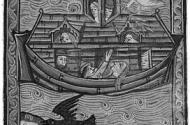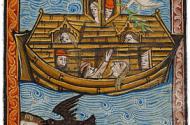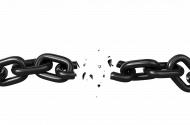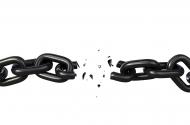While reading "How Playing Good Christian Housewife Almost Killed Me," I thought about Bakunin, a Russian anarchist and atheist, who once said, "If God did exist, it would be necessary to abolish him." There are truly dark gods of bondage and patriarchy that must be slain.
As Vyckie Garrison explains,
"Based on a literalist interpretation of Psalm 127, Quiverfull families eschew all forms of birth control. They have a high regard for the patriarchal family structure found in the Old Testament which emphasizes hierarchy, authority, and strict gender roles for men, women, boys, and girls.
“The reason you can find Quiverfull families in nearly every type of Christian congregation is because Quiverfull beliefs are not actually a radical departure from traditional Christian teachings regarding marriage and family. It is my contention that Quiverfull IS regular Christianity writ large ... lived out to its logical conclusion."
 Garrison's story is one of liberation from oppression through the unveling (or "apocalypse") of the abusiveness of both her husband and his pseudo-loving God. You can wrap abuse in any rhetorical package you like, and it still remains abuse.
Garrison's story is one of liberation from oppression through the unveling (or "apocalypse") of the abusiveness of both her husband and his pseudo-loving God. You can wrap abuse in any rhetorical package you like, and it still remains abuse.
So is this truly the logical conclusion of Christianity? Nearly half of the Christians in the United States (Edit: see qualification of this statement below) are liberal. We marry queer folk, we practice pluralism, we build homeless shelters, and we read semiotic theory. Well, not all of us. But we certainly don't take the founding Psalm of the Quiverfull movement as prescriptive, because that's not how we read the Bible:
"Sons are indeed a heritage from the Lord,
the fruit of the womb a reward.
Like arrows in the hand of a warrior
are the sons of one’s youth.
Happy is the man who has
his quiver full of them.
He shall not be put to shame
when he speaks with his enemies in the gate."
-Psalm 127
 It seems very strange to me to read a Psalm, a prayer written as a poem, as some sort of prescription for how to live. There are serious problems with interpreting this and any scripture from a literalist's perspective. It would seem that the whole fundamentalist-literalist interpretive machine would grind to a halt attempting to digest the Psalms as the "Word of God." So did God write prayers to Godself? And if Quiverfull families are copying the cultural context of pre-Roman Palestine, why not wear literal quivers full of arrows to complete the anachronism?
It seems very strange to me to read a Psalm, a prayer written as a poem, as some sort of prescription for how to live. There are serious problems with interpreting this and any scripture from a literalist's perspective. It would seem that the whole fundamentalist-literalist interpretive machine would grind to a halt attempting to digest the Psalms as the "Word of God." So did God write prayers to Godself? And if Quiverfull families are copying the cultural context of pre-Roman Palestine, why not wear literal quivers full of arrows to complete the anachronism?
In an agrarian society, your children are those who will work the land with you and help you bring in your food. In a pre-state society, your children are the ones who stand with you, armed, when raiders come to take your land. And finally, in a patriarchal society, your sons stay with you when they're grown and your daughters leave the farm to live with their husbands.
But you can imagine this verse and others like it seared in blazing letters on the inside of Vyckie Garrison's eyelids when she blinked. There is a power to Scriptures, and power is necessary to set free the captives and break the chains of the oppressed, but power is a force that can just as easily enslave as set free. Garrison was enslaved by an reading of Scripture that needs to be unmasked as oppressive, and I believe we must do so through Scripture or cede the identity of Christianity to the regressive literalists who stand against the main force of the Bible.
Is the Bible Intended to Set Free or Enslave?
As Jesus puts it at the inauguration of his ministry,
"The Spirit of the Lord is upon me,
because he has anointed me
to bring good news to the poor.
He has sent me to proclaim release to the captives
and recovery of sight to the blind,
to let the oppressed go free."
I hope and pray that all women who are in bondage to abusive relationships will be set free as Vyckie Garrison was. Oppressive theology is not Christian and needs to be denounced. "Christian" Patriarchy is designed to replace a God that is love with a husband/patriarch-priest that removes a woman's right to full spirituality that the apostles quote when establishing the church. If a "Christianity" does not liberate the captives and take the part of the oppressed, it is not Christian.
What About the Patriarchial Stuff in the Bible?
But, you may note, there are other patriarchal Scriptures that reflect patriarchy, like Paul in Colossians, "Wives, be subject to your husbands, as is fitting in the Lord. Husbands, love your wives and never treat them harshly." Paul goes on to tell slaves to obey their masters and children to obey their parents, reinforcing the order that Christians had been accused of subverting.
In another context he says "For there is neither man nor woman, slave nor free, Jew nor Greek, for all are one in Christ Jesus." And there are records of female apostles that Paul commends (Junia and Priscilla). Or the very explicit text that founds the ministry of the church that says all people, men and women, are potentially prophets. Or how Jesus stopped the stoning of the women caught in the act of adultery and seemed to treat women as equals in a society that regarded women as potentially unclean and as lesser than men.
What interpretive thread are we to follow? It seems that the closer we get to Jesus and Paul's words and deeds, the more egalitarian they seem. I find the yoking of Christianity to fundamentalism particularly ironic, given the fact that Jesus was an anti-fundamentalist, speaking harsh words against the fundamentalists of his day. He worked to bring out the roots of love within the Hebraic Scriptures, the advocacy for the poor and marginalized we see so clearly in the Hebrew prophets. Paul followed Jesus and created micro-communities that undercut the savage inequalities of Roman society by placing all, regardless of rank, around a round table, and then served as a social welfare system for widows who had no way to earn a living in a patriarchal world.
I believe that there are two strains within Scripture, an original egalitarianism that comes from Paul and Jesus, and a later attempt to squelch the social controversies that arose from that egalitarianism via the Nicene Council. Both strains exist within the text, mostly attributed to Paul. But even reformist words supposedly Paul's that are designed to empty patriarchy of its power from the inside via love are viewed as anti-progressive by modern people, or are templates for oppression for those that seek it. Our problem is not with Paul, our problem is with an uncritical reading of culture from history as a prescription for how to live today.
So If It's Complicated, Why Bother?
Some may claim inspiration to support their patriarchal claims, and they may even steal bits and pieces of the Scripture to clothe their naked ambition and use a "literalist" interpretation in order to sear particular Scriptures like brands onto those they seek to enslave. There is power in sacred texts, and that's scary. But power is precisely what's needed to free us from the oppressions of our day. Scripture is important.
That's why it's so important to insist on the liberatory reading of Scripture that the text points us towards. To choose the original progressive strain rather than the regressive backlash against it. To follow Jesus rather than the human and partially corrupted church.
Scripture Is Not a Seal Over God's Mouth
For me, Scripture is not the end of the story. I believe that the Spirit is still at work in the world, active among those who seek to follow the way of love, truth, and peace. But it is only when we ask the right questions, the kind of questions inspired by the life of Jesus, that we will be able to hear the soft whisper of the Spirit sorting out the fair from the false. We do not need to be scholars to listen to Her (yes, the Holy Spirit is feminine in Hebrew and Aramaic). We just need to humbly seek the path of love.
It is very hard for us to understand an agrarian, pre-state, patriarchal culture and what liberation looked like within it. I am certainly tired of literalist-fundamentalists who approach the text as "Gods Li'l Instruction Book" and find convenient justifications for their own will to power.
But I am equally tired of atheists and progressives who have little knowledge of or desire to know the pre-modern world judging history through the uncritial lens of the modern world. It is easy to regard reformers within history as barbaric or anti-progressive and not see the savage inequalities we ourselves accept in daily life. As Milan Kundera once said, "For the future is always mightier than the present. It will pass judgement on us, of course. And without any competence."
What do you think? Does Scripture necessarily imply a Quiverfull marriage? Was Paul a patriarchal or was he working to subvert patriarchy? Do you perceive the Bible through the lenses of liberal Christianity or conservative Christianity?
Edit: Vyckie Garrison is in danger of losing her home. But YOU, oh reader, can donate to support her in her work speaking out on her transition out of a Quiverfull relationship here.
Edit: So... some readers have pushed back on "nearly half of all Christians are liberal," and rightly so. There are at least four ways to talk about the liberal/conservative axis: socially, theologically, Scripturally, and politically. I said this based on a back-of-the-envelope calculation of various denominations and my experiences with them.
But, socially, the fact is that more than half of all Christians feel that homosexuality should be accepted rather than discouraged, so if you consider "socially liberal" to be equivalent to supporting gay marriage, there is that. I would like to see much more support for homosexuality in the Christian church.
Scripturally, less than half support the statement, "the Word of God is to be taken literally, word for word." So I would argue that more than half of Christians are liberal in their interpretation of Scripture.
Theologically, here is really no good way to define theological liberalism and no stats on it, nor am I theologically liberal.
Politically, the majority of Christians are politically liberal or moderate, but the number that consider themselves politically liberal doesn't break the high teens. So in that sense I am wrong. I am certainly biased by my experiences in Christianity, which are among liberal or radical Christians, and I really don't put much stock in the political mappings of this country. So take my statement above with a grain of salt and draw your own conclusions, my friends.








